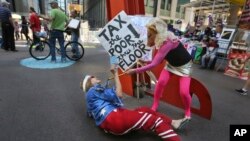For a time, Occupy Wall Street was everywhere, with its grass-roots encampments - first in New York City, then globally - and the refrain, "We are the 99 percent!''
And then it was gone. Its most famous camp in lower Manhattan was cleared out in an overnight police raid two months after it started, and other Occupy locations fizzled soon thereafter.
But five years later, demonstrators plan to gather once again in New York City's Zuccotti Park on Saturday to commemorate the movement and what they say has been a lasting impact.
They take some of the credit for introducing income inequality into the broader political discourse, for inspiring the fight for a $15 minimum wage and, most recently, for creating a receptive audience for the Democratic presidential campaign of Vermont Sen. Bernie Sanders.
And some political observers even draw a line between the movement and the rise of Republican presidential nominee Donald Trump, who tapped into the vein of suspicion against the power of elites - the 1 percent - that Occupy made ubiquitous.
"We had sort of a deep-down effect on activists all around the world,'' said Kalle Lasn of the Vancouver, British Columbia-based "Adbusters'' magazine, among those who put out the call for a protest of Wall Street to take place on Sept. 17, 2011. "We politicized a whole generation of young people who didn't quite know what to do with their activism and their feelings of anger.''
While critics of Occupy took issue with it at the time for its lack of specific demands, a clear organizational structure or strategies for next steps, it has come to resonate politically, said Heather Gautney, a sociology professor at Fordham University.
She pointed to Sanders' campaign, saying Occupy's injection of income inequality into the discourse paved the way for the Vermont senator's calls to get money out of politics, rein in Wall Street banks and provide free public college education.
Nicholas Kiersey, a political science professor at Ohio University, said Trump's political presence is part of Occupy's impact, as well.
"If Bernie Sanders represented a left-wing popular suspicion that had felt all of a sudden very legitimate in expressing its grievances, Trump, I think, represents the mirror of that from the right,'' he said. "They both, in a sense, have ridden the momentum of popular dissatisfaction.''
Other social movements have followed Occupy, such as the Fight for $15, a minimum-wage campaign that started with fast-food workers in New York City in 2012 and has spread, with victories in states including New York and California.
The environmental movement was also inspired by the idea that a small handful of elites were using their power to accumulate wealth at the expense of the many, said Guido Girgenti, an organizer with the group 350.org.
Occupy, Girgenti said, helped jumpstart "a new kind of climate movement'' that questions the power of the fossil fuel industry.
"How do we overcome that power, how do we take back our government so we can actually have solutions that work for the people, that work for the planet?'' Girgenti said.
Occupy supporter Lasn remains convinced of the movement's importance.
"I see Occupy Wall Street as being another one of those great historical moments, when something surprising happened and a whole generation got politicized,'' he said. "After a generation gets politicized, then who knows what the hell they're going to do after that?''




